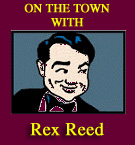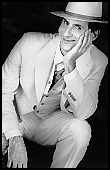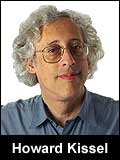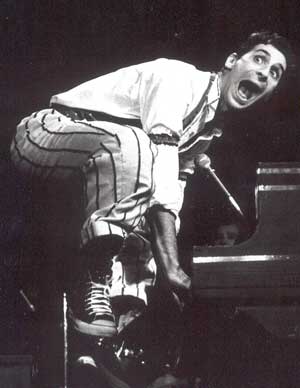 | |  |
| |
Tschaikowsky (and Other Russians)
|
Reviews and Quotes:

Danny Kaye Hit Becomes a Russian Music Survey
by Stephen Holden
New York Times, January 10, 2003
It takes a comic spark plug touched with brilliance to pull off the kind of tour de force that the aniacally exuberant singer, pianist and cutup Mark Nadler has brought (through Jan. 25) to the Firebird Upstairs Supper Club, the opulent new cabaret atop the Firebird restaurant at 365 West 46th Street. In keeping with the club's jewel-box décor and rich Russian cuisine, Mr. Nadler is performing his one-man show, "Tschaikowsky (and Other Russians)," a zany tutorial in modern Russian music spun off from one of the greatest patter songs ever written.
That song, "Tschaikowsky (and Other Russians)" became an instant classic when introduced by Danny Kaye in "Lady in the Dark" in 1941. With music by Kurt Weill and lyrics by Ira Gershwin, this torrent of tongue-twisting verbiage drops the names of 49 composers, from Malichevsky, Rubinstein and Arensky to Gretchnaninoff, Kvoschinsky and Rachmaninoff during its mad dash to an imaginary finish ine.
Those names, even the most esoteric ones, are not imaginary. As Mr. Nadler's show careers wildly along, he offers tiny musical fragments along with instant analyses (and in some cases personality profiles) of a good number of those 49. In between, he makes fanciful leaps of connection between his research and a dozen first-rate songs by composers, from Rodgers and Hart to Adam Guettel to John Wallowitch. Kurt Weill and Ogden Nash's "I'm a Stranger Here Myself," for instance, is connected to "Stranger in Paradise," adapted from a melody by the Russian composer Borodin, whom Mr. Nadler tells us was an extraordinarily nice guy.
In his musical sweep and show-business savvy, Mr. Nadler might be compared to Victor Borge, except that their stage personalities are almost diametrically opposed. Where Mr. Borge, the Danish pianist and
comedian, was a sly, suave prankster, Mr. Nadler is a raucous, excitable vaudevillian descended from Al Jolson. Mr. Nadler doesn't tease the emotions. With his ferocious pianism and crowing delivery, he is a traditional show-biz virtuoso of what might be called the hard sell. When he's on, he's "on."
|
|

Holy Stravinsky, The Russians Are Back!
by Rex Reed
January 20, 2003
Years before the plague called reality TV, Kurt Weill and Ira Gershwin wrote the ultimate celebrity challenge—a song entitled "Tchaikovsky (And Other Russians)". Performed by an unknown chorus boy named Danny Kaye, the song made its historic debut in the 1941 Broadway musical, Lady in the Dark. It also made Danny Kaye a star. This tongue twister—which consisted of the names of 49 unpronounceable Russian composers that Mr. Kaye rattled off like artillery fire in a breathtaking 39 seconds—has, for obvious reasons, rarely been performed since.
But musical legerdemain is now being repeated nightly by a nimble Jack-n-the-box named Mark Nadler in a winning new cabaret show called—what else?—Tschaikowsky (And Other Russians) that’s heating up a cold January like Dr. Zhivago’s samovar.
Appropriately, Mr. Nadler’s show has found the perfect showcase. He is inaugurating a brand-new cabaret room in the swell digs above the Firebird restaurant on West 46th Street. With its gilt-edged crown moldings, red walls of moiré silk, paintings of prancing, half-clad scarf dancers from Diaghilev ballets, and a centerpiece chandelier clamped to the ceiling with a chain, "kitsch" may b e a better word for the new Firebird Club than "elegant." But it’s the ultimate setting for Stravinsky, Rumshinsky, Mussorgsky and dozens of other Russians who pepper Mr. Nadler’s act. This is not a run-of-the-mill cabaret act for dopes. Mr. Nadler expects his audience to bring along a bit of knowledge already. "If you can afford this cover charge," he informs the audience, "I probably don’t have to tell you who Piotr Ilyich Tchaikovsky is." Let the fireworks begin! e a better word for the new Firebird Club than "elegant." But it’s the ultimate setting for Stravinsky, Rumshinsky, Mussorgsky and dozens of other Russians who pepper Mr. Nadler’s act. This is not a run-of-the-mill cabaret act for dopes. Mr. Nadler expects his audience to bring along a bit of knowledge already. "If you can afford this cover charge," he informs the audience, "I probably don’t have to tell you who Piotr Ilyich Tchaikovsky is." Let the fireworks begin!
Mr. Nadler may take slightly longer rolling all those names like Sapelnikoff, Dimitrieff, Tscherepnin and Kryjanowsky off his tongue than Danny Kaye did, but he savors every one. Telling little stories about each Russian, separating the truth from the gossip, Mr. Nadler dissects Ira Gershwin’s lyrics, analyzing them like cargo passing through an airport-security X-ray, and keeps you in stitches all the way. He also plays a soupçon of each composer’s work, "so you all get to know these guys." (Know them? I can’t even type them.) All of which leads to segues in which he samples new songs, old evergreens and contemporary styles on which all 49 composers exerted a distinct influence. The result is like Victor Borge meets Hellzapoppin’!, as Mr. Nadler slings sheet music over his head, scattering everything from Rimsky-Korsakov to Lorenz Hart all over the carpet. Threading the song together with personal anecdotes, he compares Tchaikovsky’s tribulations in 19th-century Russia with his growing up Jewish in Iowa, which somehow leads to the "Ugly Duckling" from Frank Loesser’s Hans Christian Andersen, which also starred Danny Kaye. When he gets to the lyrics about the "little black swans," his fingers are playing passages from Swan Lake. A thought or two about how those mean little ducks ended up in a sauce l’orange leads to Cole Porter’s "I Concentrate on You." Here, Mr. Nadler demonstrates a keen grasp of sensitive phrasing and soft, burnished tones seldom heard in his previous work (or, for that matter, in the rest of this act). Mr. Nadler should trust himself more on love songs; he’s developing a smoky ballad style that is a neat contrast to his usual mayhem.
But it’s his ability to imitate an exploding filing cabinet that makes this goofy, accomplished performer unique. He’s a combination of all the Marx Brothers put together, and you never know what he’ll do next. A few bars of Prokofiev’s Romeo and Juliet leads to an impromptu discussion of a PBS documentary he just watched about the teenage brain. The corny theme by Borodin that turned into "Stranger in Paradise" in Kismet may seem an obvious choice to illustrate the Russian musical heritage, but after a couple of bars, Mr. Nadler halts abruptly and—resorting to an old trick perfected by the great jazz diva Frances Faye—declares, "I can’t do it; I hate that song!" Instead, he investigates the more obscure but similar theme in Ogden Nash and Kurt Weill’s "I’m a Stranger Here Myself."
The revelation of the evening is "Manhattan Blue," a navy blue torch song by veteran saloon singer and bon vivant John Wallowitch, which should be required listening for all wannabe cabaret singers looking for material that is hauntingly different.
Dashing around the room, rearranging the furniture, and blowing kisses to friends and celebrities, Mr. Nadler turns Ira Gershwin’s "I Can’t Get Started" into breakneck-paced chop suey. Nothing to do with the Russians, you say. But the music was by Vladimir Dukelsky, a.k.a. Vernon Duke. It all blends, see? Comparing Shostakovich’s fight to escape the repressive Stalinist regime with Mary Rodgers’ struggle to overcome the powerful legacy of her father Richard is, admittedly, a big stretch, but it leads into a lovable soft-shoe routine from Ms. Rodgers’ Once Upon a Mattress, performed in a sitting position  while firmly planted at the piano bench. Part of Mr. Nadler’s charm is that what he does is risky, impudent and defies description. I won’t even tell you what he does to Sokoloff and Kopyloff, or Gretchaninoff and Rachmaninoff. As Ira Gershwin rhymed, "You’ve already undergone enoff." while firmly planted at the piano bench. Part of Mr. Nadler’s charm is that what he does is risky, impudent and defies description. I won’t even tell you what he does to Sokoloff and Kopyloff, or Gretchaninoff and Rachmaninoff. As Ira Gershwin rhymed, "You’ve already undergone enoff."
Thisamazing feat of research and chutzpah may sound like an impossible task bordering dangerously on tedium, but Mark Nadler is a musical Punchinello who pulls more rabbits out of a hat than the teenage Houdini. Talented and fearless, he never runs out of fresh ideas, and he has the wacky style and infectioushumor to pull them off. Tackling an entertainment project this cheeky and daunting, I think he may also be a little bit crazy. That’s the best part. In an otherwisedreary season of predictable revivals and ho-hum reruns, Mark Nadler an original. Mad joy is his signature, but I like the way he spreads it around. |

He's 'Russian' around with a sly cabaret act
 From the second he bounds onto the stage of the beautiful new FireBird Upstairs Supper Club, at 365 W. 46th St., Mark Nadler exhibits a spellbinding manic energy. From the second he bounds onto the stage of the beautiful new FireBird Upstairs Supper Club, at 365 W. 46th St., Mark Nadler exhibits a spellbinding manic energy.
Entitled "Tschaikowsky (and Other Russians)," his act begins with the 1941 Ira Gershwin/Kurt Weill song with the same name, whose lyrics incorporate the names of 48 largely obscure Russian composers.
Nadler, who has a rich voice, rips through it at requisite breakneck speed, then sets out — only half-facetiously — to explain who all these composers were.
Since he is also a splendid pianist, he plays musical examples that often suggest these composers should not be obscure.
Sometimes the musical illustrations are wittily absurd — like his demonstration that if you play the notes of Rimsky-Korsakov's "Flight of the Bumble Bee" as chords, they resemble those his pupil Stravinsky used in "Rite of Spring."
Often the "musicology" is merely a pretext to sing. Discussing Tchaikovsky's loneliness, for example, he launches into a tender version of Frank Loesser's "Ugly Duckling," which he interlards with passages from "Swan Lake."
The act goes far beyond its ostensibly giddy premise.
I hesitate to say it has an intellectual subtext, because I don't want to frighten anyone.
Nadler's premise is that the artists we remember are those who take risks. To prove it, he sings works by a wild range of composers, from  Vernon Duke to Adam Guettel to the too-little-known John Wallowitch — all with deep resonance. Vernon Duke to Adam Guettel to the too-little-known John Wallowitch — all with deep resonance.
He even does Stephen Sondheim's "Next," from "Pacific Overtures," which I never expected to hear in a nightclub.
What Nadler demonstrates is that great cabaret is really theater, stimulating and exhilarating, outrageous and hilarious.
Originally published on January 8, 2003
|
|
 In 1941 Danny Kaye became an overnight sensation in "Lady In The Dark" when he stopped the show cold singing Kurt Weill’s and Ira Gershwin’s, "Tchaikowski (and Other Russians)", a list of forty-eight Russian composers rattled off at break-neck speed. In his new show, Tschaikowsky (and Other Russians), award-winning entertainer, Mark Nadler, deconstructs this song by examining each of these composers -- sometimes briefly, sometimes at length. In 1941 Danny Kaye became an overnight sensation in "Lady In The Dark" when he stopped the show cold singing Kurt Weill’s and Ira Gershwin’s, "Tchaikowski (and Other Russians)", a list of forty-eight Russian composers rattled off at break-neck speed. In his new show, Tschaikowsky (and Other Russians), award-winning entertainer, Mark Nadler, deconstructs this song by examining each of these composers -- sometimes briefly, sometimes at length.
These examinations take us to songs like "I Can’t Get Started", "I Concentrate On You", "The Ugly Duckling" (infused with "Swan Lake") and eleven other great American songs. The material ranges from standards to new works by Adam Guettel, (the grand-son of and heir apparent to Richard Rodgers) and Carol Hall, (the composer/lyricist of "The Best Little Whorehouse In Texas".) The show features high comedy, virtuosic piano playing and Mark even does a touching and thrilling softshoe while accompanying himself at the piano to "Very Soft Shoes", (from Once Upon A Mattress). Because of all of the biographical and historical information discussed in the show, it is extremely educational without ever losing its firm foot-hold in entertainment. Tchaikowski (and Other Russians) is extremely funny and tuneful and yet, is also a serious examination of the nature of fame and legacy. By the time the show concludes with Mark singing the song, "Tschaikowsky (and Other Russians)" while playing, simultaneously, a bit of music by each of the composers, (including Rachmaninoff, Stravinsky, Prokoviev, Rimsky-Korsakov and of couse, Tschaikowsky), the audience is on their feet cheering. |
|
The Siegels' Nightlife Notes
THEATREMANIA.com
Nov 8, 2002
A Cabaret Kaleidescope
By: Barbara & Scott Siegel
The art of cabaret is often considered to have reached its height when a gifted singer performs great songs with sensational arrangements. Well, cabaret also achieves something akin to perfection when a musical comedy madman named Mark Nadler takes on the famous patter song "Tchaikowski" (Kurt Weill/Ira Gershwin) and then proceeds to create a comically brilliant show in which everything flows from the wellspring of the act's title tune.
The act is called Tschaikowsky (and Other Russians) and it had its New York City premiere at the Algonquin Hotel's Oak Room during the Cabaret Convention. It was part of the Oak Room's Cabaret Cavalcade; but that night, with Nadler at the piano, it was more like a Cabaret Kaleidescope. He brought color, originality, and an almost infinite sense of possibility to what many people incorrectly believe is an
archaic art form.
The act begins with Nadler's performance of "Tschaikowsky," which was one of Danny Kaye's signature songs. It's a blazing opener that sets the stage for Nadler's extraordinary conceit. After singing the song, he notes that people always ask him how he remembers the lyrics, a wild and woolly string of the names of approximately four dozen Russian composers, ranging from the famous to the footnote. He replies that it's easy if you know who the Russian composers are. With that, he launches into a generous one-hour plus act in which he identifies the reason -- musical and/or personal -- why each composer was included in the song. If this description makes the show sound academic or esoteric, let us assure you that it is anything but. nothing is sacred to Nadler except laughter, and he sings and sasses his way through these Russian composers (and their relationship to Ira Gershwin's lyric) with more relish than you'll find at Nathan's.
As he comically chomps through selections of Russian classical music, Nadler gives us a history lesson we won't soon forget; he also performs about a dozen other songs, many of them far more familiar. He seamlessly connects tunes as disparate as "I Concentrate on You" (Cole Porter), "Only a Broken Heart" (Carol Hall), and "The Ugly Duckling" (Frank Loesser) to his narrative with an almost miraculous ease by
placing them in the continuum of music that followed "Tschaikowsky."
Nadler is a performer for whom the word "Big" was invented. Nonetheless, he can be delicate when the music calls upon him to be so. And while his voice isn't the prettiest instrument in cabaret, it is surprisingly expressive. Despite his well earned reputation for edgy, in-your-face humor, he can also do a wonderful job with a passionate ballad. It is, in fact, his ability to modulate his performance style that keeps the driving narrative of this show from exhausting the audience. Nadler packs an amazing amount of research into the act but tosses it off with the brio of a performer who is confident that he will always have more ascinating nuggets of information to impart, better musical examples to make his points, and ever more wonderful songs to sing. That confidence is well-earned.
If anything in the world of New York nightlife is remotely comparable to Nadler's show, it is Rob Kapilow's entertaining deconstruction of standards for Lincoln Center's American Songbook Series. Kapilow will be at it again on November 15 with a Bernstein program featuring performances by Brian d'Arcy James and Ana Marie Andricain, at the Kaplan Penthouse. This is exactly where Mark Nadler's Tschaikowsky (and Other Russians) should be playing next year; it is a first cousin to Kapilow's concept, but from the loopy side of the family. Nadler's show is a natural for the Lincoln Center series because it's a graduate level course on the Great American Songbook and its antecedents, as well as one of the most inspired and entertaining musical comedy acts of this or any other year.
| | |
 | |  |
|



 e a better word for the new Firebird Club than "elegant." But it’s the ultimate setting for Stravinsky, Rumshinsky, Mussorgsky and dozens of other Russians who pepper Mr. Nadler’s act. This is not a run-of-the-mill cabaret act for dopes. Mr. Nadler expects his audience to bring along a bit of knowledge already. "If you can afford this cover charge," he informs the audience, "I probably don’t have to tell you who Piotr Ilyich Tchaikovsky is." Let the fireworks begin!
e a better word for the new Firebird Club than "elegant." But it’s the ultimate setting for Stravinsky, Rumshinsky, Mussorgsky and dozens of other Russians who pepper Mr. Nadler’s act. This is not a run-of-the-mill cabaret act for dopes. Mr. Nadler expects his audience to bring along a bit of knowledge already. "If you can afford this cover charge," he informs the audience, "I probably don’t have to tell you who Piotr Ilyich Tchaikovsky is." Let the fireworks begin! while firmly planted at the piano bench. Part of Mr. Nadler’s charm is that what he does is risky, impudent and defies description. I won’t even tell you what he does to Sokoloff and Kopyloff, or Gretchaninoff and Rachmaninoff. As Ira Gershwin rhymed, "You’ve already undergone enoff."
while firmly planted at the piano bench. Part of Mr. Nadler’s charm is that what he does is risky, impudent and defies description. I won’t even tell you what he does to Sokoloff and Kopyloff, or Gretchaninoff and Rachmaninoff. As Ira Gershwin rhymed, "You’ve already undergone enoff." 
 From the second he bounds onto the stage of the beautiful new FireBird Upstairs Supper Club, at 365 W. 46th St., Mark Nadler exhibits a spellbinding manic energy.
From the second he bounds onto the stage of the beautiful new FireBird Upstairs Supper Club, at 365 W. 46th St., Mark Nadler exhibits a spellbinding manic energy. Vernon Duke to Adam Guettel to the too-little-known John Wallowitch — all with deep resonance.
Vernon Duke to Adam Guettel to the too-little-known John Wallowitch — all with deep resonance. In 1941 Danny Kaye became an overnight sensation in "Lady In The Dark" when he stopped the show cold singing Kurt Weill’s and Ira Gershwin’s, "Tchaikowski (and Other Russians)", a list of forty-eight Russian composers rattled off at break-neck speed. In his new show, Tschaikowsky (and Other Russians), award-winning entertainer, Mark Nadler, deconstructs this song by examining each of these composers -- sometimes briefly, sometimes at length.
In 1941 Danny Kaye became an overnight sensation in "Lady In The Dark" when he stopped the show cold singing Kurt Weill’s and Ira Gershwin’s, "Tchaikowski (and Other Russians)", a list of forty-eight Russian composers rattled off at break-neck speed. In his new show, Tschaikowsky (and Other Russians), award-winning entertainer, Mark Nadler, deconstructs this song by examining each of these composers -- sometimes briefly, sometimes at length.